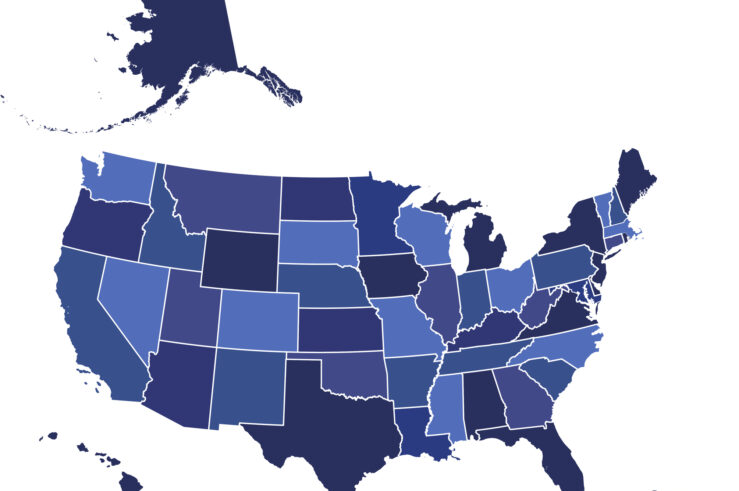FTC Statement of Regulatory Priorities: Storm Clouds Are Looming
The Federal Trade Commission (FTC) appears committed—at least, for the moment—to a path of regulatory overreach. The commission’s Dec. 10 Statement of Regulatory Priorities (SRP) offers, in addition to a periodic review of existing rules and the status of proposed rules in the pipeline, a sneak preview of new “unfair methods of competition” (UMC) and ... FTC Statement of Regulatory Priorities: Storm Clouds Are Looming
FTC Challenge to Nvidia-Arm Vertical Merger: Potential Efficiency Justifications
The Federal Trade Commission (FTC) on Dec. 2 filed an administrative complaint to block the vertical merger between Nvidia Corp., a graphics chip supplier, and Arm Ltd., a computing-processor designer. The press release accompanying the complaint stresses the allegation that “the combined firm would have the means and incentive to stifle innovative next-generation technologies, including ... FTC Challenge to Nvidia-Arm Vertical Merger: Potential Efficiency Justifications
Oldie-but-Baddie: The Revival of an Antitrust ‘Efficiencies Offense’?
Recent antitrust forays on both sides of the Atlantic have unfortunate echoes of the oldie-but-baddie “efficiencies offense” that once plagued American and European merger analysis (and, more broadly, reflected a “big is bad” theory of antitrust). After a very short overview of the history of merger efficiencies analysis under American and European competition law, we ... Oldie-but-Baddie: The Revival of an Antitrust ‘Efficiencies Offense’?
What is the Appropriate Role for State Antitrust Enforcement?
In the U.S. system of dual federal and state sovereigns, a normative analysis reveals principles that could guide state antitrust-enforcement priorities, to promote complementarity in federal and state antitrust policy, and thereby advance consumer welfare. Discussion Positive analysis reveals that state antitrust enforcement is a firmly entrenched feature of American antitrust policy. The U.S. Supreme ... What is the Appropriate Role for State Antitrust Enforcement?
Consumer Welfare-Based Antitrust Enforcement is the Superior Means to Deal with Large Digital-Platform Competition Issues
There has been a rapid proliferation of proposals in recent years to closely regulate competition among large digital platforms. The European Union’s Digital Markets Act (DMA, which will become effective in 2023) imposes a variety of data-use, interoperability, and non-self-preferencing obligations on digital “gatekeeper” firms. A host of other regulatory schemes are being considered in ... Consumer Welfare-Based Antitrust Enforcement is the Superior Means to Deal with Large Digital-Platform Competition Issues
FTC Moves Closer Toward Ex Ante Merger Regulation
The Federal Trade Commission (FTC) has taken another step away from case-specific evaluation of proposed mergers and toward an ex ante regulatory approach in its Oct. 25 “Statement of the Commission on Use of Prior Approval Provisions in Merger Orders.” Though not unexpected, this unfortunate initiative once again manifests the current FTC leadership’s disdain for ... FTC Moves Closer Toward Ex Ante Merger Regulation
‘New Madison Approach’ Should Be Retained to Promote American Innovation
The leading contribution to sound competition policy made by former Assistant U.S. Attorney General Makan Delrahim was his enunciation of the “New Madison Approach” to patent-antitrust enforcement—and, in particular, to the antitrust treatment of standard essential patent licensing (see, for example, here, here, and here). In short (citations omitted): The New Madison Approach (“NMA”) advanced ... ‘New Madison Approach’ Should Be Retained to Promote American Innovation
Broad-Based FTC Data-Privacy and Security Rulemaking Would Flunk a Cost-Benefit Test
A debate has broken out among the four sitting members of the Federal Trade Commission (FTC) in connection with the recently submitted FTC Report to Congress on Privacy and Security. Chair Lina Khan argues that the commission “must explore using its rulemaking tools to codify baseline protections,” while Commissioner Rebecca Kelly Slaughter has urged the ... Broad-Based FTC Data-Privacy and Security Rulemaking Would Flunk a Cost-Benefit Test
Khan’s ‘Vision and Priorities for the FTC’ Statement Lacks Humility and Strategic Insight
Federal Trade Commission (FTC) Chair Lina Khan’s Sept. 22 memorandum to FTC commissioners and staff—entitled “Vision and Priorities for the FTC” (VP Memo)—offers valuable insights into the chair’s strategy and policy agenda for the commission. Unfortunately, it lacks an appreciation for the limits of antitrust and consumer-protection law; it also would have benefited from greater ... Khan’s ‘Vision and Priorities for the FTC’ Statement Lacks Humility and Strategic Insight
More Evidence that the Patent System Promotes Dynamic Competition and Consumer Welfare
The patent system is too often caricatured as involving the grant of “monopolies” that may be used to delay entry and retard competition in key sectors of the economy. The accumulation of allegedly “poor-quality” patents into thickets and portfolios held by “patent trolls” is said by critics to spawn excessive royalty-licensing demands and threatened “holdups” ... More Evidence that the Patent System Promotes Dynamic Competition and Consumer Welfare
FTC Antitrust Enforcement and the Rule of Law
The language of the federal antitrust laws is extremely general. Over more than a century, the federal courts have applied common-law techniques to construe this general language to provide guidance to the private sector as to what does or does not run afoul of the law. The interpretive process has been fraught with some uncertainty, ... FTC Antitrust Enforcement and the Rule of Law
Congress Should Not Grant the FTC Untrammeled Authority to Obtain Monetary Relief
The U.S. House this week passed H.R. 2668, the Consumer Protection and Recovery Act (CPRA), which authorizes the Federal Trade Commission (FTC) to seek monetary relief in federal courts for injunctions brought under Section 13(b) of the Federal Trade Commission Act. Potential relief under the CPRA is comprehensive. It includes “restitution for losses, rescission or ... Congress Should Not Grant the FTC Untrammeled Authority to Obtain Monetary Relief











